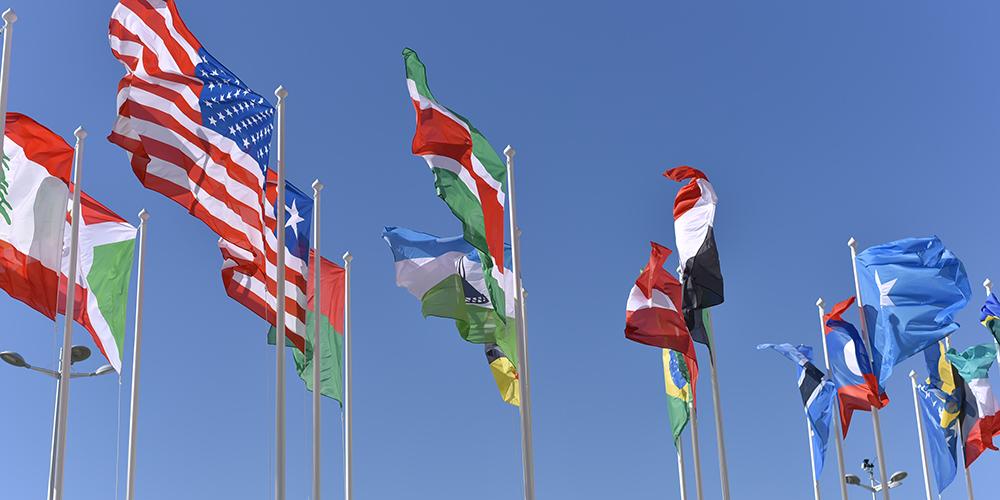What is an International Relations Dissertation?
An International Relations dissertation is an in-depth research project that explores the complexities of global interactions between nations. It covers diverse areas such as diplomacy, trade, conflict resolution, human rights, and the role of international organizations.
Students pursuing an undergraduate dissertation in International Relations analyze how countries engage with each other and how these interactions influence global policies and events.
Why Are International Relations Dissertation Topics Important?
Choosing the best dissertation topics in International Relations is crucial because this field plays a vital role in shaping global politics and economic policies. Researching current International Relations topics allows students to explore critical issues such as:
- Peacekeeping and security strategies
- Economic cooperation and trade agreements
- International law and diplomatic relations
- The impact of global organizations on world affairs
By selecting impactful International Relations research topics, students contribute to a deeper understanding of global challenges and can even influence real-world policies and decision-making.
What Are the Best Research Topics in International Relations?
When selecting undergraduate dissertation topics in International Relations, consider those that address contemporary global issues. Some popular current International Relations topics include:
- The role of cybersecurity in global diplomacy
- The effectiveness of international sanctions
- Climate change policies and global cooperation
- The evolution of human rights in international law
- The impact of economic alliances on world politics
Choosing a well-researched and relevant topic ensures that your dissertation remains valuable both academically and practically.
Tips for Writing an International Relations Dissertation
- Choose a Relevant Topic – Focus on International Relations research topics that are timely and globally significant.
- Use Reliable Sources – Reference academic journals, government publications, and reputable news sources to strengthen your arguments.
- Analyze Different Perspectives – Consider multiple viewpoints on international issues to present a balanced and well-rounded analysis.
- Stay Organized – Develop a clear outline to ensure logical and coherent presentation of your dissertation.
By following these tips and selecting one of the best dissertation topics in International Relations, you can create a compelling research project that contributes to the understanding of global affairs.
Dissertation Topics Brief Service
At dissertation-help.co.uk, we provide a comprehensive International Relations Dissertation Topics service to guide you in selecting the perfect dissertation topic. Our expert writers assist in generating unique ideas and crafting a detailed 500-word topic brief. This service ensures that you’re on the right track with a focused, academically rigorous topic for your dissertation.
Paid Topic Consultation Service
You will get the topics first as per the given requirements, and then the brief which includes;
- An explanation why we choose this topic.
- 2-3 research questions.
- Key literature resources identification.
- Suitable methodology with identification of raw sample size, and data collection method
- View a sample of topic consultation service
Download Sample Dissertations Pdf
Before you start working on your own dissertation, it’s helpful to take a look at some sample dissertations. Our collection of sample dissertations covers a wide range of civil law topics and can give you a better understanding of how to structure and write your own dissertation.
You can download free dissertation samples and topic briefs to get an idea of how to approach your topic and craft an engaging dissertation. This can serve as inspiration and guidance throughout your research process.
List of Top Dissertation Topics in International Relations
Explore compelling International Relations dissertation topics, covering global diplomacy, international security, foreign policy, human rights, economic relations, and more. Find research ideas that address contemporary geopolitical challenges and emerging trends in global affairs.
It includes comparative studies, case analyses, and critical evaluations of the roles of international institutions and state actors, with a specific focus on the UK, Europe, and global dynamics.
Gender and International Relations
- Women in UK Peacekeeping Operations: Breaking Barriers and Enhancing Effectiveness
A critical analysis of the role of women in peacekeeping operations, with a specific focus on the UK’s contribution and challenges faced by female peacekeepers in conflict zones. - Gender Mainstreaming in EU Development Programs: A Comparative Study of Successes and Failures
A case study comparing EU-led gender mainstreaming policies in development programs across member states, highlighting the impact on gender equality outcomes. - Masculinity and Militarism in Europe: The Role of Gender Norms in Shaping Military Culture
A comparative study exploring the influence of masculinity on militarism in European countries, with a focus on the UK and France.
Energy Security and Geopolitics
- The Renewable Energy Transition and Its Geopolitical Implications for UK-EU Relations
Analyzing the geopolitical challenges and opportunities presented by the UK’s transition to renewable energy and its impact on relations with European neighbors post-Brexit. - Energy Interdependence between the European Union and Russia: A Comparative Analysis of Vulnerabilities and Strategic Responses
A critical analysis of the energy security dynamics between the EU and Russia, exploring the implications of energy dependence for EU foreign policy. - Geopolitics of Oil and the UK’s Role in the Middle East: A Case Study of Post-Brexit Strategy
Examining the UK’s evolving foreign policy toward oil-rich regions in the Middle East, focusing on the implications of Brexit on energy security and geopolitical alignments.
Ethnic Conflict and Nationalism
- Ethnic Identity and Conflict Resolution in the UK: A Case Study of the Northern Ireland Peace Process
A detailed study of how ethnic identity influences conflict resolution strategies, focusing on the Northern Ireland peace process and lessons for future ethnic conflicts within the UK. - Nationalism and Secessionist Movements in Europe: A Comparative Study of Catalonia and Scotland
A comparative analysis of the independence movements in Catalonia and Scotland, focusing on their causes, political dynamics, and international implications. - Ethnic Conflict and State-Building in Eastern Europe: The Case of Ukraine Post-2014
A case study on ethnic conflict and state-building in Ukraine following the annexation of Crimea and the ongoing conflict in the Donbas region, with a focus on international response.
Religion and Politics
- Religious Fundamentalism and Global Security: The Impact of Islamist Radicalization on UK Foreign Policy
Analyzing how religious fundamentalism, particularly Islamist radicalization, influences the UK’s foreign policy, focusing on counterterrorism efforts and international relations. - Interfaith Dialogue and Conflict Resolution in Europe: A Case Study of the UK’s Role in Promoting Religious Tolerance
A study of the UK’s efforts in fostering interfaith dialogue to resolve religious tensions and its impact on domestic and international relations. - Religion and Human Rights in Europe: A Critical Analysis of the UK’s Approach to Religious Freedom for Minorities
Examining the intersection of religion and human rights in the UK, focusing on the legal and societal challenges surrounding religious freedom for minority communities.
Postcolonial Studies and Decolonization
- Legacies of Colonialism in Modern UK Foreign Policy: A Critical Analysis of Post-Colonial Relations with the Commonwealth
A critical analysis of the ongoing influence of colonial legacies on the UK’s foreign policy, particularly in its relationships with Commonwealth nations. - Decolonizing Development: A Comparative Study of UK and EU Approaches to Indigenous Rights in Africa
A comparative analysis of the UK and EU’s development policies toward indigenous populations in Africa, focusing on decolonization efforts and challenges faced. - Neocolonialism and Its Impact on Global South: The UK’s Role in African Development Post-Brexit
Analyzing the role of the UK in neocolonial relationships with African nations post-Brexit, with a focus on trade, aid, and political influence.
Global Governance and International Institutions
- The Role of the United Nations in Post-Brexit European Security
A critical analysis of how the United Nations engages with security challenges in Europe, with a focus on the UK’s evolving role post-Brexit. - Reforming the World Trade Organization: Challenges and Prospects for the European Union
A comparative study of the EU’s approach to reforming the WTO, highlighting challenges in global trade disputes and prospects for multilateralism. - Assessing the Effectiveness of International Criminal Courts: A Case Study of the UK’s Involvement
A focused analysis of the UK’s involvement in the International Criminal Court (ICC), evaluating its impact on international justice and human rights.
Security Studies
- Nuclear Proliferation in Europe: A Comparative Study of the UK and France’s Nuclear Policies
A critical study of nuclear non-proliferation efforts in Europe, comparing the nuclear policies of the UK and France within the context of global security. - Cybersecurity Threats in the 21st Century: The UK’s Role in Counteracting Cyber Warfare
Analyzing the UK’s approach to cybersecurity and its role in mitigating cyber threats in the European context, with a focus on national and international cooperation. - Humanitarian Intervention and the Responsibility to Protect: A Case Study of NATO’s Role in Libya
A focused examination of NATO’s intervention in Libya as a case study for the Responsibility to Protect (R2P) doctrine, analyzing its successes and failures.
Diplomacy and Foreign Policy
- Soft Power and Public Diplomacy: UK Strategies Post-Brexit
A case study on the UK’s use of soft power and public diplomacy after Brexit, evaluating its influence on global affairs, particularly within the Commonwealth. - Diplomatic Negotiations in the Middle East Peace Process: A UK and EU Comparative Study
A comparative analysis of the UK and EU’s diplomatic roles in the Middle East peace process, assessing their influence on peacebuilding efforts. - Climate Diplomacy in the EU: Addressing Environmental Challenges and Policy Coordination
A study of EU climate diplomacy, focusing on policy coordination among member states and the EU’s role in global climate agreements.
International Political Economy
- Globalization and Economic Interdependence in the EU: A Post-Brexit Analysis
Analyzing the impacts of Brexit on economic interdependence within the EU, focusing on trade relations, supply chains, and regional stability. - The Impact of Trade Wars on EU-UK Relations Post-Brexit
A study of the economic implications of global trade wars on post-Brexit UK-EU relations, focusing on trade agreements and economic resilience. - Development Aid and Its Effectiveness in Promoting Stability: A UK-Based Analysis of Aid to Africa
Evaluating the effectiveness of UK foreign aid in promoting political and economic stability in sub-Saharan Africa, with a focus on long-term outcomes.
Conflict Resolution and Peacebuilding
- Post-Conflict Reconstruction in the Balkans: Lessons for European Integration
A critical analysis of post-conflict reconstruction efforts in the Balkans, drawing lessons for EU integration strategies in conflict-affected regions. - Mediation in Ethno-Religious Conflicts: A Case Study of the UK’s Role in Northern Ireland
A focused study on the UK’s role in mediating ethno-religious conflicts in Northern Ireland, assessing the effectiveness of peacebuilding measures. - Transitional Justice and Reconciliation Efforts in the Former Yugoslavia
Analyzing transitional justice processes in the former Yugoslavia, focusing on the challenges of reconciliation and lessons for other post-conflict societies.
Regional Studies
- European Integration: Challenges and Opportunities for Eastern European States Post-Brexit
A study of how Brexit influences European integration, particularly in Eastern Europe, exploring challenges and opportunities for accession countries. - Security Dynamics in the Asia-Pacific: Lessons for EU-Asia Relations
A comparative analysis of security dynamics in the Asia-Pacific and their implications for EU foreign policy and security cooperation. - The African Union’s Role in Promoting Peace and Development: A Case Study of the Central African Republic
Examining the African Union’s role in promoting peace and development, with a focus on its intervention in the Central African Republic.
Human Rights and Humanitarian Issues
- Refugee Crisis and EU Responses: A Comparative Analysis of the UK and Germany
A case study comparing the refugee crisis response of the UK and Germany, analyzing policy approaches, integration challenges, and public opinion. - Women’s Rights as Human Rights: Progress and Challenges in Europe
A critical analysis of women’s rights in Europe, focusing on progress and challenges faced in achieving gender equality in EU member states. - Genocide Prevention and International Law: A Study of European Approaches Post-Rwanda
Analyzing the effectiveness of European approaches to genocide prevention through international law, with a focus on post-Rwanda initiatives.
Environmental Politics
- Climate Change Diplomacy in the EU: Disagreements and Policy Negotiations Post-COP26
A focused study on EU climate diplomacy post-COP26, exploring policy disagreements and challenges in international climate negotiations. - Transnational Environmental Movements: Their Impact on European Union Environmental Policies
A critical study of transnational environmental movements and their influence on shaping EU environmental policies and regulations. - Water Scarcity and Conflict: A Case Study of Tensions Between Turkey and Syria
Analyzing the geopolitical implications of water scarcity, focusing on the conflict between Turkey and Syria over shared water resources.
Terrorism and Counterterrorism
- Radicalization and Extremism in the Digital Age: The UK’s Response to Online Terrorist Recruitment
A study of radicalization in the digital age, focusing on the UK’s counterterrorism strategies and measures to prevent online extremist recruitment. - Counterterrorism Strategies in Europe: Effectiveness and Ethical Considerations
A comparative analysis of counterterrorism strategies in France, Germany, and the UK, exploring their effectiveness and ethical dilemmas. - Financing Terrorism: Disrupting Terrorist Funding Networks in the EU and the UK
Analyzing strategies for disrupting terrorist financing networks in the EU and the UK, with a focus on regulatory frameworks and international cooperation.
Global Health Governance
- Pandemics and Global Health Security: The UK’s Role in International Health Crisis Management
A case study of the UK’s response to pandemics, such as COVID-19, and its role in global health security and international cooperation. - Access to Essential Medicines: Equity and Ethics in the EU’s Health Policies
A study of ethical issues surrounding access to essential medicines in the EU, focusing on policy frameworks to address health inequities. - The Role of International Organizations in Health Crisis Management: A Case Study of the WHO’s Response to Ebola
Analyzing the role of the World Health Organization (WHO) in managing the Ebola crisis, with lessons for future global health governance.
Migration and Refugee Studies
- Forced Migration: Causes and Consequences for European Refugee Policy Post-Syria Conflict
A focused analysis of the causes and consequences of forced migration due to the Syrian conflict, examining its impact on EU refugee policies. - Integration Policies for Refugees: A Comparative Study of the UK and Sweden’s Approaches
A comparative analysis of refugee integration policies in the UK and Sweden, assessing their effectiveness and challenges in promoting social cohesion. - Climate Refugees: Addressing a Growing Concern in the EU’s Migration Strategy
Analyzing the emerging issue of climate refugees and the EU’s response, focusing on policy frameworks and the challenges of international cooperation.
Cultural Diplomacy and Soft Power
- Cultural Exchange Programs: Impact on Bilateral Relations Between the UK and China
A case study exploring the impact of cultural exchange programs on UK-China relations, focusing on soft power strategies in diplomacy. - Branding Nations: The Role of Cultural Image in UK Foreign Policy
Analyzing how the UK uses cultural branding to enhance its global image and influence foreign policy decisions, particularly in post-Brexit diplomacy. - Sports Diplomacy: The UK’s Role in Building International Relations Through Sports
A study on how the UK uses sports diplomacy to build and strengthen international relationships, with a focus on the Olympic Games and football diplomacy.
Conclusion
Writing an International Relations Dissertation is an exciting opportunity to explore global issues that matter. Whether you’re interested in international security, global trade, or human rights, your research can make a difference. Choose international relations dissertation topics that resonates with you and has global relevance and remember to back up your arguments with reliable sources and multiple perspectives.
FAQs
1. What are some popular International Relations dissertation topics?
Popular topics include international security, the role of the United Nations, global trade agreements, and the impact of globalization on national sovereignty.
2. How do I choose International Relations dissertation topics?
Select a topic that interests you, is relevant to current global events, and has plenty of available research material.
3. What skills are needed to write an International Relations dissertation?
You need strong analytical skills, the ability to evaluate different perspectives, and good research skills to find and use reliable sources.
4. How long does it take to complete an International Relations dissertation?
It usually takes several months to a year, depending on the complexity of the topic and the depth of research required.
List of Related Posts
- 99+ Business Analytics Dissertation Topics Ideas in 2025
- 99 Top International Business Dissertation Topics for 2025
- 99+ Business Management Dissertation Topics in 2025
- 99+ Best Business Administration Research Topics for 2025
- 99+Business Dissertation Topics In 2025
- Top 99 MBA Dissertation Topics for 2025 [Updated]
- Business Research Proposal Topics Ideas for Students






